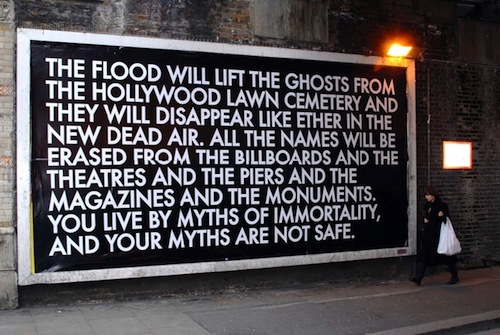Street Artist Robert Montgomery Vandalizing London with Situationist Poetry

The Independent reports that a "poetry vandal" is on the loose in London. Actually, it's Scottish artist Robert Montgomery, who has been going out at night "illegally plastering over advertisements with posters covered in his poetry." More:
His very pleasing verse is presented in white typography on a black background, screaming out ideas about beauty, consumerism and hypocrisy, among other things. The elegant words, and their sparse presentation, have been appearing on hoardings for the last ten years. But Montgomery, who trained at Edinburgh College of Art, and whose intellectual basis for working tumbles out in glorious verbal torrents, is not really a street artist.
Instead, he "WORKS IN A POETIC AND MELANCHOLIC POST-SITUATIONIST TRADITION," as has been written. The paper also interviewed Montgomery:
You’re obviously working in a way resonant of street artists, but you don’t seem to have a street art perspective. You’ve got training behind you which street artists, graffitists in particular, tend not to have. Has the street art scene embraced you?
Yeah, I’m working from a more academic background on the streets, but I do feel an emotional connection with street artiVasts. In fact I’m doing a collaboration with an East London graffitist from Bow, called Krae. He’s a classic graffiti writer, grew up on a housing estate, is very much from the street streets. This piece that I showed in Venice called All Palaces Are Temporary Palaces really resonated with him, so he asked me if he could use it for a T-shirt.
I did at a certain point do some work that was like writing. It wasn’t graffiti art in its strictest sense, but it was writing the words with spray paint. I decided that it was easy to ghettoise that. So I decided to work in a way that was visually very simple – all with black backgrounds on the billboards, all with white text- so that it won’t be categorised as graffiti art and written off before people have read it. At the same time, it’s a very unspectacular style, so it’s evident that it’s not advertising too.
Tabloids use white on black typography to make things stand out on their front pages – is that what you were going for?
[Laughs] I want the words to appear almost like statements from the collective unconscious, in a sense. They are quite subtle ideas, and poetic ones; sometimes political points mixed with poetic allusions. The words can be complex, so I want them to look as straightforward as possible. If I was to tell you what I thought of the tabloid press it would probably be unprintable.
Well, let’s move on. Do [you] use particular poems or extracts of text for particular places?
Sometimes. One of the ones I’ve just done in Old Street (pictured) faces towards Shoreditch House which is where, until recently, Occupy was installed. I was actually planning to do a collaborative piece with them, but they got turfed out on 25 January so that didn’t happen. But one of those texts is very much a testimony to the positive things I think Occupy are doing. It starts, “There are wooden houses on land in far-away places that don’t cost much money, and strings of lights that make paths to them gently, and do not turn off the stars. And 100 black flags of anarchists held up at night 100 miles apart.”
...
You’re coming at art from a fairly politicised context. How does that fit in with your Situationist influences? There is a big parallel between the general strike in Paris 1968 (when the movement was at its height) and what’s going on in the UK now.
The Situationists certainly have been almost a point of obsession for me since I was at art school. I think Guy Debord’s idea of society as a spectacle – he comes from a post-Marxists perspective, but he analyses the coalition of capitalism and the media and predicts, what he calls, a “Spectacular” life where humans will feel disconnected from the things we make. A society where we live divorced from real life, surrounded by images designed to sell us things and give us paranoia. I think we are now living in the Spectacular age. The Situationists’ contribution to the May 1968 uprising was to write poems on walls of the campus of the Sorbonne. They saw poetry as an agent for political change, which I find fascinating.
He's also goal-oriented: "All I want to do in life is to be able to pay the rent and make the billboards. That’s my complete and utter ambition." Read it all here, where you can also view a gallery of Montgomery's street work.


